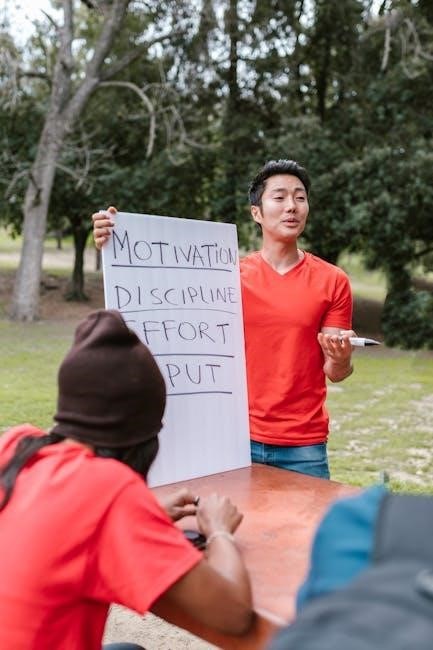The 21-Day Fasting Guide, inspired by the Daniel Fast, offers a transformative 21-day journey of spiritual growth, physical renewal, and mental clarity through prayer and clean eating.
1.1 What is the 21-Day Fasting Guide?
The 21-Day Fasting Guide is a structured program combining prayer, spiritual reflection, and a plant-based diet inspired by the biblical prophet Daniel. It lasts 21 days, focusing on physical and spiritual renewal. Participants abstain from animal products, sweets, and processed foods, consuming fruits, vegetables, whole grains, and water. This guide helps individuals reset habits, deepen their faith, and achieve health benefits like weight loss and improved energy. It’s a holistic approach to spiritual growth and physical well-being.
1.2 Origins and Purpose of the 21-Day Fast
The 21-Day Fast originates from the biblical account of Daniel, who fasted for spiritual clarity and physical health. Its purpose is to seek God, reset habits, and gain spiritual breakthroughs. Rooted in Daniel 1:12-17 and Daniel 10:3, this fast emphasizes prayer, reflection, and a clean diet. It helps participants deepen their faith, improve health, and align with God’s will, fostering a holistic transformation of body, mind, and spirit through disciplined fasting and intentional prayer.
1.3 Benefits of a 21-Day Fast
The 21-Day Fast offers numerous benefits, including weight loss, improved metabolism, and enhanced energy levels. It promotes mental clarity, reduces inflammation, and supports overall health. Spiritually, it deepens faith, fosters intimacy with God, and provides clarity for life’s challenges. Many participants experience improved skin health and reduced oxidative stress. This fast also helps break unhealthy habits and cultivates self-discipline, leading to a renewed sense of purpose and spiritual growth. The combination of prayer and fasting creates a powerful tool for personal transformation and holistic well-being.

Understanding the Daniel Fast
The Daniel Fast is a 21-day spiritual practice inspired by Daniel’s biblical diet, focusing on prayer, clean eating, and plant-based foods for spiritual growth and physical renewal.
2.1 What is the Daniel Fast?
The Daniel Fast is a 21-day partial fast inspired by the prophet Daniel’s dietary choices in the Bible. It involves abstaining from animal products, sweets, and processed foods, focusing instead on plant-based foods like fruits, vegetables, whole grains, nuts, and seeds. This fast is typically paired with prayer and is designed to promote spiritual growth, physical health, and a deeper connection with God. It is often used as a tool for seeking spiritual breakthroughs, healing, and personal transformation.
2.2 Biblical Basis for the Daniel Fast
The Daniel Fast is rooted in the biblical account of the prophet Daniel, who abstained from royal food and wine, choosing instead to eat vegetables and drink water for ten days (Daniel 1:12-17). This dietary choice led to improved health and wisdom. Additionally, Daniel fasted for 21 days to seek clarity and vision, avoiding meat, wine, and luxuries (Daniel 10:3). These biblical accounts form the foundation of the Daniel Fast, emphasizing purity, self-discipline, and trust in God’s provision.
2.3 Key Principles of the Daniel Fast
The Daniel Fast centers on abstaining from meat, dairy, sweets, and processed foods, focusing instead on fruits, vegetables, whole grains, and water. It emphasizes natural, unrefined foods as outlined in Daniel 1:12-17. Participants avoid additives, preservatives, and artificial substances, adhering to a plant-based diet. The fast also prioritizes prayer and spiritual reflection, aligning with biblical teachings on humility and seeking God. This 21-day commitment fosters self-discipline, detoxifies the body, and deepens spiritual connection, mirroring Daniel’s devotion and trust in divine provision.

Preparing for Your 21-Day Fast
Prepare mentally, spiritually, and physically by setting clear goals, cleansing your body, and focusing on prayer. Plan meals, stay hydrated, and seek support for a successful journey.
3.1 Mental and Spiritual Preparation
Mental and spiritual preparation is crucial for a successful 21-day fast. Start by setting clear intentions, seeking accountability, and reflecting on your purpose. Begin each day with prayer, Bible reading, and devotionals to stay focused. Mentally prepare by understanding the challenges and benefits, ensuring a positive mindset. Spiritually, surrender distractions, and align your heart with God’s purpose. This foundation will help you stay committed and embrace the transformative journey ahead with clarity and purpose.
3.2 Physical Preparation
Physical preparation for the 21-day fast involves gradually transitioning to a cleaner diet rich in fruits, vegetables, whole grains, and nuts. Avoid processed foods, sugars, and unhealthy fats to minimize withdrawal symptoms. Stay hydrated with water and herbal teas, and consider reducing caffeine intake. Listen to your body and adjust portion sizes to maintain energy levels. Consult a healthcare provider if you have medical conditions. This preparation ensures your body is ready for the fast, promoting a smoother transition and maximizing health benefits.

3.3 Setting Clear Goals for Your Fast
Setting clear goals for your 21-day fast is essential for a focused and meaningful experience. Define spiritual objectives, such as deepening your prayer life or seeking God’s guidance. Physical goals might include improved health or weight loss. Write down specific intentions to stay motivated. Consider journaling to track progress and reflect on breakthroughs. Establishing a prayer plan or daily devotional schedule can also enhance your journey. Clarity in your goals will help you stay committed and maximize the spiritual and physical benefits of your fast.
Meal Planning and Recipes
The 21-Day Fasting Guide offers a structured meal plan with delicious, easy recipes, focusing on plant-based foods, whole grains, and avoiding processed items for a healthy fast.
4.1 Foods to Eat on the Daniel Fast
The Daniel Fast focuses on whole, plant-based foods. Allowed items include fruits, vegetables, whole grains, nuts, seeds, and legumes. These should be consumed in their most natural form. Water is the primary beverage. Avoid processed foods, sweeteners, and animal products. This diet emphasizes clean eating to support spiritual and physical health during the fast, promoting a deeper connection with God through disciplined eating habits.
4.2 Foods to Avoid on the Daniel Fast
The Daniel Fast prohibits animal products, including meat, dairy, eggs, and fish. Processed foods, sweeteners, and artificial additives are also excluded. Avoid sugary drinks, alcohol, and refined grains. No bread, pasta, or baked goods unless made from whole grains. Focus on natural, unprocessed foods to align with the fast’s spiritual and physical goals. This restriction helps maintain discipline and deepen your focus on prayer and God during the 21-day period.
4.3 Sample Meal Plan for 21 Days
A 21-day Daniel Fast meal plan includes plant-based, whole foods. Breakfast options like smoothies with fruits, nuts, and veggies. Lunches feature salads, soups, and whole grains; Dinners include stir-fries, roasted vegetables, and legume-based dishes. Snacks like fruits, nuts, and veggie sticks are encouraged. A downloadable PDF guide offers detailed recipes and meal prep tips, ensuring variety and nutrition throughout the fast. This structured plan helps maintain discipline and focus on spiritual goals while nourishing the body.
4.4 Delicious and Easy Daniel Fast Recipes
Enjoy a variety of tasty, plant-based recipes designed for the Daniel Fast. Start with smoothies like mango green or creamy avocado banana. Savor hearty dishes like lentil soup, roasted vegetables, and quinoa salads. Indulge in low-carb options such as cinnamon bread and almond butter pancakes. These recipes are simple, nutritious, and flavorful, ensuring you stay satisfied throughout your fast. A downloadable guide offers step-by-step instructions and meal ideas to keep your journey delicious and stress-free.

Spiritual Growth Through Fasting
Fasting deepens your spiritual connection, fostering prayer, reflection, and seeking God. It helps overcome challenges, brings breakthroughs, and strengthens your faith, drawing you closer to divine guidance.
5.1 The Role of Prayer in Fasting
Prayer is the cornerstone of fasting, deepening your spiritual connection and seeking God’s guidance. It helps you overcome challenges, receive healing, and grow closer to Him. Start each day with prayer, read Scripture, and reflect on His Word. Prayer redirects your focus to God, creating spiritual pathways for clarity and strength. Through consistent prayer, fasting becomes a powerful tool for breakthroughs, relational restoration, and spiritual renewal, drawing you into a deeper relationship with God.
5.2 Daily Devotionals and Reflections
Daily devotionals and reflections are essential for spiritual growth during fasting. Start each day with prayer and Bible reading, seeking God’s presence. Reflect on His Word, documenting insights and lessons learned. This practice helps renew your mind, align your heart with God’s will, and deepen your faith. Journaling your thoughts and prayers fosters accountability and clarity, while meditation on Scripture strengthens your spiritual foundation. Regular reflection ensures a meaningful and transformative fasting experience, drawing you closer to God and His purpose for your life.
5.3 Overcoming Spiritual Challenges During the Fast
Fasting often reveals spiritual challenges like discouragement or doubt. Stay consistent in prayer, seeking God’s strength and guidance. Reflect on biblical truths and promises to renew your mind. Engage in daily devotionals to stay focused on your spiritual goals. Surround yourself with supportive community to encourage and uplift you. Remember, fasting is not just about abstaining from food but drawing closer to God. Persevere, and trust Him to bring breakthrough and transformation in your life.

Health Benefits of the 21-Day Fast
The 21-Day Fast promotes weight loss, improves metabolism, enhances energy, and reduces inflammation. It also supports better health markers, contributing to overall physical and mental well-being.
6.1 Weight Loss and Improved Metabolism

The 21-Day Fast often results in significant weight loss, typically 5-6 pounds, due to its plant-based diet and elimination of processed foods. By focusing on fruits, vegetables, and whole grains, participants experience improved metabolism and reduced oxidative stress. Studies show enhanced energy levels and clearer skin, while the avoidance of unhealthy additives in processed foods further supports weight management and overall metabolic health. This structured approach promotes sustainable physical and mental well-being, aligning with the fast’s spiritual and health goals.
6.2 Enhanced Energy Levels and Mental Clarity
The 21-Day Fast often leads to increased energy and mental clarity as the body adapts to a cleaner, plant-based diet. By eliminating processed foods and focusing on nutrient-rich options, participants experience improved cognitive function and reduced fatigue. Studies, such as those by Dr. Richard Bloomer, show that fasting can enhance energy levels and promote clearer skin, contributing to an overall sense of well-being and mental sharpness. This transformation supports both spiritual and physical goals during the fast.
6.3 Reduced Inflammation and Improved Health Markers
The 21-Day Fast has been shown to reduce inflammation and improve key health markers, such as blood pressure and cholesterol levels. Studies by Dr. Richard Bloomer indicate that participants experience lower oxidative stress, which contributes to long-term disease prevention. By focusing on a plant-based diet, the fast eliminates harmful additives and processed foods, promoting a healthier bodily state. These physical improvements often align with the spiritual and mental renewal experienced during the fast, creating a holistic transformation.

Maintaining Motivation and Discipline
Staying motivated during the 21-Day Fast involves daily prayer, community support, and tracking progress. Focusing on spiritual goals helps maintain discipline and commitment throughout the journey.

7.1 Staying Committed to Your Fast
Staying committed to your 21-Day Fast requires a strong spiritual foundation and clear goals. Begin each day with prayer and devotions to maintain focus. Surround yourself with a supportive community to encourage accountability and motivation; Track your progress and celebrate small victories to stay inspired. Remember, fasting is not just about food but about deepening your relationship with God. Stay disciplined by reminding yourself of the purpose behind your fast and the benefits it brings to your spiritual and physical well-being.
7.2 Managing Cravings and Hunger
Managing cravings and hunger during your 21-Day Fast requires discipline and strategic planning. Stay hydrated by drinking plenty of water and consider incorporating vegetable juices. Plan balanced meals with whole grains, fruits, and vegetables to keep you satisfied. Healthy snacks like nuts and seeds can help curb hunger between meals. Focus on prayer and reflection when cravings arise, redirecting your mind to your spiritual goals. The Daniel Fast diet naturally reduces hunger over time as your body adapts to cleaner eating habits.
7.3 Building a Support System
Building a strong support system is crucial for successfully completing your 21-Day Fast. Join a community or prayer group to share experiences and stay motivated. Surround yourself with like-minded individuals who understand your journey. Share meal ideas and encouragement to keep spirits high. Accountability partners can help you stay on track, while collective prayer strengthens resolve. Celebrate milestones together and lean on others during challenging moments. A supportive network enhances both spiritual and physical endurance, making the fasting journey more manageable and rewarding.

Concluding Your Fast
Concluding your 21-Day Fast involves safely reintroducing foods, reflecting on spiritual growth, and implementing lasting lifestyle changes to maintain physical and mental well-being.
8.1 Breaking Your Fast Safely
Breaking your 21-Day Fast requires careful planning to avoid discomfort. Start with small portions of gentle foods like fruits, vegetables, and whole grains. Avoid heavy or rich meals initially. Stay hydrated with water and herbal teas. Gradually reintroduce foods to allow your digestive system to adjust. Listen to your body and avoid overeating. Consider incorporating broths or smoothies to ease back into eating. Prioritize nutrient-dense foods to maintain the health benefits achieved during your fast.
8.2 Reflecting on Your Journey
Reflecting on your 21-Day Fast journey is a powerful way to celebrate your progress and identify spiritual and physical growth. Take time to journal your experiences, noting breakthroughs, challenges, and lessons learned. Acknowledge how prayer and devotion deepened your connection with God. Celebrate the discipline and resilience you’ve developed. Use this reflection to set long-term goals for maintaining a healthier lifestyle and spiritual habits. Gratitude and self-awareness will help you carry the benefits of your fast into everyday life.
8.3 Implementing Long-Term Lifestyle Changes
After completing your 21-Day Fast, transition into sustainable habits by adopting a balanced diet rich in whole foods and maintaining regular prayer practices. Set realistic goals, such as incorporating intermittent fasting or continuing plant-based meals. Track your progress and celebrate small victories. Prioritize hydration, exercise, and mental wellness. Use the discipline gained during your fast to fuel long-term change. Consider periodic fasting for spiritual renewal and seek community support for accountability. This journey is not just about 21 days—it’s about a lifelong commitment to health and faith.